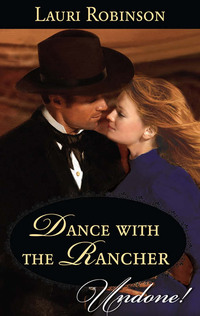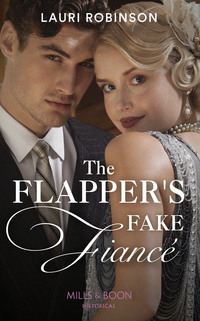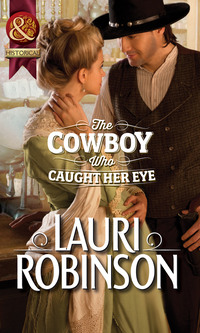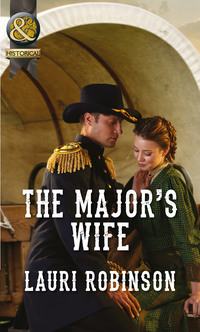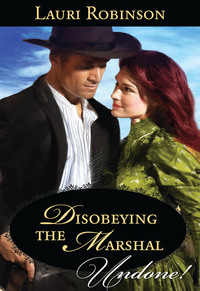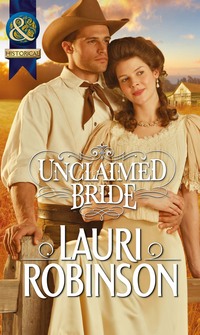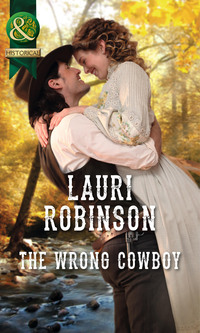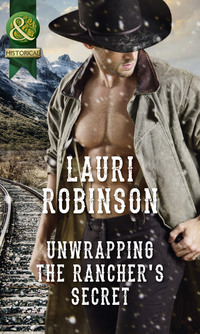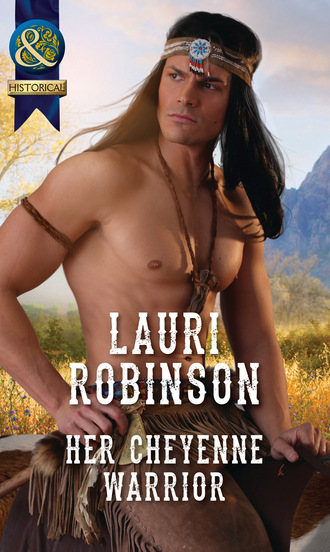
Полная версия
Her Cheyenne Warrior
“Why not?” Tillie asked.
At the same time, Betty asked, “Oh, how sad. Did you love Andrew dearly?”
As astute as ever, Meg jumped to her feet. “Lorna will have to finish her tale another night. It’s late, and morning comes early.” She then started giving out orders as to what needed to be done before they crawled beneath the wagons.
No one argued, and a short time later, Lorna and Meg were under one wagon, Betty and Tillie under the other. Meg didn’t utter another word, and neither did Lorna. There was nothing to say. She’d never told Meg what had happened that night back in London. She didn’t have to; her friend seemed to know it was something she didn’t want to remember. To talk about. Just like a hundred other things Meg seemed to know.
Lorna shut her mind off, something she’d learned how to do years ago, and closed her eyes, knowing her body was tired enough she’d fall asleep. That was one good thing about this trip. It was exhausting.
* * *
The next morning, when the early-dawn sunlight awoke them, they all crawled out from beneath the wagons. No one complained of being tired or of sore muscles as they began their work of the day. Breakfast consisted of tea and the biscuits Betty had made the night before along with tough pieces of bacon. Betty insisted they have meat—bacon that was—once a day. She’d save the grease and make gravy out of it tonight, as she did every day. A year ago, Lorna would have quivered at such meals. Now she simply accepted them, and was thankful she didn’t have to depend upon herself to do the cooking.
Another good thing about these women was that they were affable without any of the falseness of those she’d known all her life. Each one wished her a happy birthday with sincerity and no expectations of learning more. That was the good thing about mornings. It was a new day. A new start. The conversation of last night was as dead to her as everything else she’d left behind.
Once the meal was over, she and Meg gathered the mules they’d staked nearby and hitched them to the wagons while the other two cleaned up their campsite. Lorna appreciated that Betty and Tillie didn’t mind doing those chores. Kitchen duties had never appealed to her, not like the stables. That was one thing she missed, the fine horseflesh that had lived in the barns back home. Her father had taught her to ride when she was very little, and the memories of riding alongside him were the only ones she cherished and refused to allow to become sullied.
Once set, all four of them climbed aboard the wagons.
The lead wagon was Meg’s and she drove it; the second one was Betty’s. Tillie’s had been lost in the river accident that took her husband’s life. This morning, Lorna sat in the driver’s seat of the second wagon. She and Betty, as well as Tillie, took turns driving it. Another chore she didn’t mind. Each step the animals took led her farther and farther away from England, and closer to California.
Tillie was on the seat beside her and Betty beside Meg. The trail they followed was little more than curved indents in the ground. Summer grass had grown up tall and thick, and Lorna wondered how Meg deciphered where the trail went and where it didn’t.
“Meg says we might cross into Wyoming today,” Tillie said.
“We very well may,” Lorna answered. They’d passed the strange formation of Chimney Rock a few days ago, and ever since then, Meg had been saying they’d be crossing into Wyoming soon. Truth was, as far as any of them knew, they might already have entered Wyoming. It wasn’t as if there was a big sign saying Welcome to Wyoming or any such thing. The area was neither a state nor territory, just a large plot of land the government hadn’t figured out what they wanted to do with yet. That was how Meg described it.
Lorna, like the others, had long ago put their trust in Meg’s knowledge. Although she had no idea how Meg had acquired such knowledge, it was admirable.
“Do you ever wish you hadn’t left England?” Tillie asked.
“No,” Lorna answered. She’d have to be dense to believe what she’d revealed last night wouldn’t eventually bring about questions, but she didn’t need to elaborate on them. Leaving England had been her decision, and she’d never questioned it. Nor would she. She was glad to be gone from there, and far from everyone who still lived there.
“Will you ever go back?”
“No.”
“You don’t like talking about it, do you?”
“No,” Lorna said. “That part of my life is over. No need to talk or think about it.” That, of course, was easier said than done. And a lie. Some days the memories just wouldn’t stop. More so today, an exact year since her stepfather had stolen the one thing that had been truly hers, and only hers. She’d win in the end, though; once she arrived in San Francisco, Douglas would get his due.
“Adam and I lived in Ohio,” Tillie said. “I’ve told you that before, but I didn’t mention that Adam’s father said he either had to join the army or go west.”
“I know,” Lorna said.
“How would you know? I never mentioned it.”
“Because most every man on that wagon train had made that same choice.”
“He chose west because of me,” Tillie said. “I was afraid he’d die being a soldier.”
Lorna held her breath to brace for what was to come. Tears most likely, and more blame. Tillie was a fan of both. The girl had had a hard time, Lorna would admit that, but at some point, enough becomes enough, as she herself had learned.
“Can I tell you something?” Tillie asked.
“Yes.” The answer hadn’t been needed. Tillie would go on either way.
“I’m glad we went west. I’m sorry Adam died, and that I lost the baby, but if he’d gone to the army, I’d be living with his parents now and would never have met you, or Meg or Betty. I would never have known how strong I am. How much I can do.”
Lorna glanced sideways just to make sure those words had come from Tillie. It wasn’t likely a stranger had appeared out of nowhere and jumped up on the seat beside her, but hearing Tillie saying such things was about as unexpected. After assuring herself that it was Tillie’s big brown eyes looking back at her—her curly red-brown hair was well covered by the black habit—Lorna grinned. “I’m glad you came west, too.” She was sorry for Tillie’s losses, but had said that plenty of times before. “And I’m glad you’re on this trip with me,” she added instead.
They conversed of minor things then, just to lighten the monotony of the trail. Tall grass went on as far as they could see in this wide-open country. There were a few small hills here and there, and a large line of trees along the river that ran just south of them. They’d camp near the river again tonight, like every night. Meg said farther into Wyoming, they wouldn’t have the water they did here in Nebraska. Lorna hoped they wouldn’t have the high temperatures, either. It was unrelenting. The yards of black material covering her from head to toe intensified the heat, making the sun twice as hot as it ever had been in England.
By the time they stopped for the noon meal, Lorna questioned if she’d ever been so sweaty and miserable in her life. She wasted no time in unhitching the mules and leading them down to the river for water. The poor animals had to be beyond parched.
“Sure is a hot one,” Meg said, dropping the lead rope as her mules stepped into the water and started slurping.
“Miserably so.” Lorna pushed the tight habit off her head and lifted the heavy braid of her hair off the back of her neck to catch the breeze. The relief wasn’t nearly enough. “I feel like jumping in that river and swimming clear to the other side.”
Meg looked up and down the river, and then over her shoulder where Betty and Tillie were busy seeing to the noon meal. It wouldn’t be much, just more tea and biscuits, and maybe some dried apple chips.
“Why don’t we?”
Lorna pulled her gaze off the other women to glance at Meg. She was smiling, which in itself was a bit rare. “I don’t know,” Lorna said, trying to conceal how her heart leaped inside her chest. “Why don’t we?”
“No reason I can think of,” Meg said. “You?”
Lorna shook her head. “Not a one.”
Meg glanced up and down the river one more time. “I gotta say, a swim sounds like a better way to celebrate a birthday than any stupid party with fancy dresses covered in lace.”
Lorna laughed. “I agree. And getting out of these heavy dresses for a moment would be heavenly, Sister Meg.”
Meg laughed. “Then, stake down your mules, Sister Lorna.”
Grinning, and with her heart skipping with excitement, Lorna didn’t waste a minute in staking the animals and then unbraiding her hair. She hadn’t been swimming in years, but it wasn’t something a person forgot. Hopefully! Then again, submerging herself in that cool river water would be worth almost drowning.
Meg shouted for Betty and Tillie to join them. In no time, all four of them were stripped down to their underclothes and running for the water, giggling like girls half their age. The water was as refreshing as Lorna imagined and not nearly as deep as it looked. She was halfway across the river before the water reached her waist, at which point she pinched her nose and fell onto her back. Sinking beneath the water was trivial, yet the most spectacular event she’d had in months. When she resurfaced, she stretched out and slowly kicked her feet to propel her around as she floated on her back. The water was like taking a bath, except that it smelled earthy and pure instead of cloying and sweet from the various flower oils her maid, Anna, had drizzled in the brass tub before she’d proclaim the bath was ready.
Of all the people she’d thought of over the past year, Anna hadn’t been in her memories at all. Yet the woman should have been. She’d been the one mainstay in her life, clicking her tongue and waggling a finger at the slightest misstep. Maybe that was why. As Tillie had pointed out, learning to take care of oneself was liberating. Lorna liked that. Taking responsibility suited her.
Stretching her arms out at her sides, she smiled up at the bright blue sky. Not answering to anyone was liberating, too. So was not being committed to doing anything or being anywhere she didn’t want to be or do.
This was how her life would be from now on. Free to do as she pleased.
“Well, well, well, what do we have here?”
The chill that encompassed her had nothing to do with the water. Lorna dropped her feet. As they sank into the soft sand, she turned to where the familiar male voice had come from.
Jacob Lerber stood on the riverbank, along with three other men who looked just as uncouth. They reminded her of the stories she’d heard about wolves, complete with evil eyes and yellow teeth.
All four of them had guns hanging off their waists. She’d learned since coming to America that only those who didn’t mind killing broadly displayed their weapons. Which was why she kept hers hidden, and would have had it on her right now if she hadn’t decided to go swimming. As it was, her little gun was still in a deep pocket in her dress...which was on the shore not five feet from Lerber. The man who’d sold her the tiny pistol had said it wouldn’t do any harm at a distance, but if a man got within three feet of her it would stop him dead in his tracks. The very reason she’d bought it. No man would ever get that close to her again.
“What do you want, Lerber?” Meg shouted.
“Hush,” Lorna hissed, inching her way to where the others stood in the waist-deep water. What Lerber wanted was obvious—making sure he didn’t get it needed to be the focus.
“Well, now, I was just worried about the four of you out here all alone,” Jacob drawled. “Thought I best backtrack and check how you fine ladies were getting along.”
“More likely you got kicked off the wagon train,” Meg yelled.
Lorna agreed, but hushed Meg again. “We’re getting along just fine,” Lorna said. “Thanks for stopping.”
“Thanks for stopping?” Betty hissed under her breath.
“Shush,” Lorna insisted.
“You can shush us all you want,” Meg snapped. “They ain’t leaving. Mark my word.”
“I know that,” Lorna replied. “I’m just trying to come up with a plan.”
“What you ladies whispering about out there?” Jacob shouted. “How happy you are to see us?”
The others beside him chortled, and one slapped him on the back as if Jacob was full of wit.
Intelligence was not what Jacob was known for. “Delighted for sure,” Lorna answered while gradually twisting her neck to see how far the opposite bank was. The men hadn’t yet stepped in the water. From the looks of Jacob’s greasy hair, he was either afraid of or opposed to water. If she and the others swam—
Her brain stopped midthought. What she saw on the other side of the river sent a shiver rippling her spine all the way to the top of her head. Lorna shifted her feet to solidify her stance in the wet sand and get a better view, just to make sure she wasn’t seeing things. The way her throat plugged said she wasn’t imagining anything.
“Indians,” Meg whispered.
That was exactly what they were. Indians. Too many to count. And they weren’t afraid of water. Especially the one on the large black horse who was front and center. He was huge and so formidable the lump in Lorna’s throat silenced her scream as his horse leaped into the water like a beast arising from the caverns of hell. The very image of her worst nightmare.
Water splashed as other horses lunged to follow him, and the Indians on their backs started making high-pitched yipping noises.
Frozen by a form of fear she’d never known existed, Lorna couldn’t move, didn’t move until the screeches of the women penetrated her senses. She spun to tell them to hush, but her attention landed on the other riverbank, where Jacob and his cronies ran beside their horses, attempting to leap into their saddles before the animals left them afoot. All four managed to mount, and watching them gallop away would have been a relief if the riverbed beneath her hadn’t been vibrating.
Waves swirled as the Indians rode past. Their stocky horses were swift and surefooted, and leaped out of the water to take after Jacob and his men. Their crazy yipping noises echoed off the water, the air, and vibrated deep inside her.
“What are we going to do?” Betty was asking. “What are we going to do?” Lorna spun back around, toward the bank still lined with huge horses and bare chests. One by one, the horses stepped into the water, and her fear returned ten times over. As her gaze once again landed on the great black horse hurdling the opposite bank, she muttered, “Hell if I know.”
Chapter Two
Black Horse slowed his mount while signaling four warriors to pursue the white men. It would take no more than that. He then spun his horse around to return to the riverbank and the women. Moments ago the four of them had been frolicking in the water like a family of otters in the spring. The sight of it, how their white clothes had puffed up around them, had made his braves laugh. He did not laugh.
One of his hunting parties had reported the women—four of them in two wagons—traveling alongside the river two days ago. At one time, many wagon trains traveled this route, but since the white men started fighting each other, the trains had almost disappeared. He had liked that, had welcomed the idea of fewer white people on Cheyenne land. The peace his people had known while his grandfather had been leading their band was his greatest desire. Inside, though, he knew peace would only happen when the white man and the bands learned to settle disagreements without bloodshed. He had left the last tribal council knowing that would not happen any time soon. Although many had agreed with him, some had not.
If not for the white men reported to be trailing these women, he would have let the women pass through Cheyenne land without notice, but he could not allow Tsitsistas to be blamed for what could happen to them.
Stopping at the water’s edge, Black Horse drew in a breath of warm summer air and held it. Bringing white women into his village would upset the serenity, but so would the army soldiers if something happened to the women. This was Cheyenne land, and his band would be blamed.
The tallest woman, the one with long brown hair that curled in spirals like wood peeled thin with a sharp knife, was not crying like the others, or running for the bank. She stared at him with eyes the same blue as the living water that falls from the mountains when the snow leaves. There was bravery in her eyes. A rarity. All the white women he had met acted like the other three. Other than Ayashe—Little One—but she had been living with Tsitsistas for many seasons.
Keeping his eyes locked on the woman’s, he motioned for braves to gather the others and hitch the mules to the wagons, and then nudged his horse toward the water. The woman did not move. Or blink. She stood there like a mahpe he’e, a water woman, who had emerged from the waves during a great storm, daring to defy a leader of the people. He had to focus to keep his lips from curling into a smile. Only a white woman would believe such was possible.
She held up one hand. “We come in peace.”
No white person comes in peace. Not letting anything show, especially that he understood her language, Black Horse lifted his chin and nodded toward the wagons. “Tosa’e nehestahe?”
The frown tugging her brows together said she did not understand his question of where she came from. He had not expected her to know the language of his people, but had wanted to be sure. Others like her had come before. Dressed in their black robes that covered everything but their faces, they tried to teach people about a god written on the pages of a book. Each Indian Nation had their own god and no need to believe in others, or books.
Faint victory shouts indicated his warriors had caught up with the men that had disappeared over a small knoll, and Black Horse waved a hand toward the wagons, indicating the woman should join the others.
Her cold glare glanced at the other women putting their black dresses over their wet clothes. Only white people would do that. Their ways made little sense.
Turning back to him, her eyes narrowed as she asked, “What do you want with us?”
There were many advantages to knowing the white man’s language, and more advantages in not letting that knowledge be known. He waved toward the wagon again.
Her sneer increased. “What? You grunt and wave a hand, and expect me to know what you want and to obey? Let me assure you that will not happen.”
She was not like the other holy women he had encountered. They had all been quiet and timid. She was neither.
Earlier she had skimmed across the water with the ease of an otter, and catching the sense she was about to do so again, Black Horse urged Horse into the water.
The woman looked one way and then the other, and then, just as he expected, she shot under the water.
The water was not deep enough to conceal her or her white clothes, and he tapped his heels against Horse’s sides. He caught up with her just as she lifted her head out of the water, and the look of shock on her face made him hide a smile.
“Get away from me, you filthy beast,” she shouted. “Get away!”
As one would a snake, Black Horse shot out a hand and grabbed her behind the head. Grasping the material between her shoulders, he lifted her out of the water. She was as slippery as a fish and her fingernails scratched at his arm while she continued shouting and kicking her feet. Despite her fighting, he draped her across the front shoulders of Horse. Keeping her there took both hands, but Horse needed nothing more than a touch of heels to spin around and return to the bank. He and the animal had been together since Horse had been a colt. Shortly after acquiring Horse, others had started calling him He Who Rides a Black Horse, and though many events had occurred that offered to provide him with a different name, he did not take one. He liked being known as Black Horse.
Her kicking and squirming almost caused her to slip from his hold when Horse stopped on the bank to shake the water from his hide. In that one quiet moment, Black Horse could feel her heart racing against his thigh. It startled him briefly, the contact of another person. It had been a long time.
Once Horse started walking again, she started her kicking, squirming and screaming all over and Black Horse renewed the pressure on her back. When Horse stopped near the wagon, Black Horse balled the material across her back into his hand. Just as he started to lift her, a sharp sting shot across his leg.
Before her teeth could sink deeper, he wrenched her off his lap and dropped her to the ground. “Poeso,” he hissed. She had the claws and teeth of a poeso—a wild cat. There was no blood, because the hide leggings had protected his skin. They had protected him against far worse, but he still had to rub the sting from the area.
His braves as well as the other women were watching, waiting to see what would happen next. If he had been only a warrior, the braves would have laughed at what the white woman had done, but because he was the leader of their people they stood in silence, waiting to follow his next move, whatever he chose it to be.
The woman continued to hiss and snarl like a cat, having no idea she had just offended a leader of the Cheyenne Nation, and Black Horse accepted her ignorance. He prided himself on being a highly respected leader, one who did not make decisions based on spite, but on thoughtful deliberations. He ignored her screeching while gesturing for the men to finish hitching up the mules—until one word she said caught his attention.
Black Horse jumped off Horse and wrenched the bundle of clothes out of her hands, searching until he found what she was after. Holding up the little gun, he laughed. It was smaller than his fingers.
“Laugh all you want, you beast!” she shouted. “It can still kill you. It’s called a gun.”
Why did all white people think only they knew what guns were? The fur trade wars over a century ago had brought guns to all the people, back before Tsitsistas had started following the buffalo. But guns wore out and could not be repaired, and were much less accurate when it came to hunting than bows and arrows. Their thundering noise scared more buffalo than their bullets killed.
He tucked the gun in the pouch hanging on his side and tossed the clothes at the woman, along with the pair of stiff boots that were lying on the bank. Shrill calls from his returning warriors filled the air and he grinned. Just as he had known, each brave led a horse behind him.
“They killed them that fast?” the woman asked, eyes wide.
“Hova’ahane,” he answered, knowing she had no idea he had just told her no. Tsitsistas were not conquerors. Not the northern bands. His warriors rarely killed unless threatened. It was his goal to make sure it remained that way.
“Tahee’evonehnestse,” he said, once again waving toward the wagon, telling her to get on with the others, who had obeyed his braves while this poeso battled him. There was always one. Always a he’e—a woman—who refused to listen; for a moment he wondered if saving her, if being a fair and just leader, was worth the trouble.
* * *
Lorna knew the brown beast of a man, with black hair hanging way past his shoulders and wearing a scowl as fierce as the rest of him, wanted her to get on the wagon with the others, but she wasn’t about to. Men, no matter what nationality, thought that because of their strength they could order women about, make them grovel and beg and plea. She’d lived that way once, and never would again. Furthermore, this man was worse than all the others she’d known. Stronger. The strength of his hold could have easily broken her spine, and his thighs had been harder than logs. The fact he hadn’t killed her said one thing. He was saving her for worse. Much worse.
That wouldn’t happen again.
Turning toward Meg, Tillie and Betty, who were peeking out of the canvas opening in the back of Meg’s wagon, Lorna shouted, “Get out of there! We can’t go with them!”




